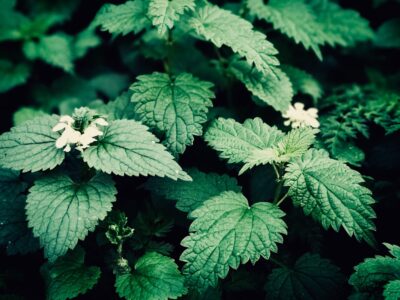Exploring the Abundant Benefits of Nettles
Filed under Herbal Remedies

Nettles, often considered a common weed, possess remarkable properties that have been utilized for centuries in various cultures around the world. Despite their stinging nature, nettles offer a plethora of benefits that extend to human health, ecological balance, and culinary experiences. This essay aims to shed light on the numerous advantages of nettles, emphasizing their medicinal properties, environmental significance, and culinary versatility.
Medicinal Benefits
Nettles have long been recognized for their medicinal properties and have been used as a natural remedy for countless ailments. Rich in vitamins, minerals, and phytochemicals, nettles offer an array of health benefits. They are renowned for their anti-inflammatory properties, which make them effective in alleviating conditions such as arthritis, gout, and allergies. The leaves of the nettle plant contain compounds that inhibit inflammatory enzymes and provide relief from pain and swelling.
Furthermore, nettles are a valuable source of antioxidants, which combat free radicals and promote overall well-being. Regular consumption of nettle tea or supplements can support the immune system, improve digestion, and enhance the body’s detoxification processes. The diuretic properties of nettles can also assist in managing urinary tract issues and promoting kidney health.
Environmental Significance
Beyond their medicinal applications, nettles play a crucial role in maintaining ecological balance and biodiversity. As a resilient plant, nettles are often pioneers in disturbed areas, acting as a catalyst for soil regeneration. Their extensive root systems help improve soil structure and prevent erosion. Nettles also attract and support a diverse range of insects, including butterflies and bees, making them essential for pollination and fostering biodiversity in ecosystems.
Nettles have been traditionally used as a natural fertilizer due to their high nitrogen content. By cultivating nettles, farmers can enhance soil fertility, reduce the need for synthetic fertilizers, and promote sustainable agriculture practices. Moreover, nettles serve as a habitat and food source for various animal species, contributing to the overall health and vitality of ecosystems.
Culinary Versatility
Nettles possess an impressive culinary versatility and can be incorporated into a wide range of dishes. While caution must be exercised when handling fresh nettles to avoid the stinging hairs, once cooked or dried, they lose their sting and offer a unique flavor profile. Nettle leaves are often used in soups, stews, and teas, imparting a rich, earthy taste. They can also be sautéed, steamed, or blended into pestos and sauces, adding depth and nutritional value to meals.
In terms of nutrition, nettles are a powerhouse of vitamins and minerals, including vitamins A, C, and K, iron, calcium, and magnesium. Incorporating nettles into the diet can provide a natural boost of nutrients and support overall health and vitality. Furthermore, their versatility in culinary applications promotes creativity in the kitchen and offers an opportunity to explore new flavors and textures.
Nettles, often overlooked and misunderstood, offer an array of remarkable benefits that extend beyond their stinging reputation. From their medicinal properties that alleviate various health conditions to their ecological significance in promoting biodiversity and soil health, and their culinary versatility that enhances flavors and nutrition, nettles are a true marvel of nature. Embracing the abundance of benefits nettles offer can contribute to our well-being, environmental sustainability, and gastronomic experiences, reminding us of the extraordinary potential that lies in the simplest of plants.
